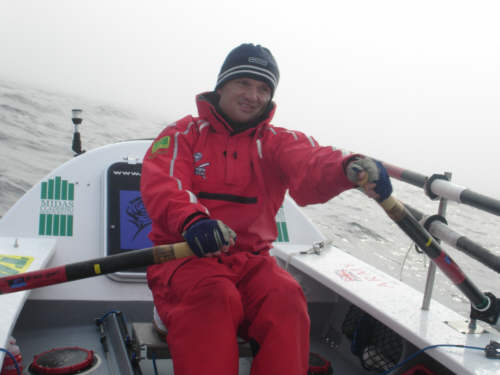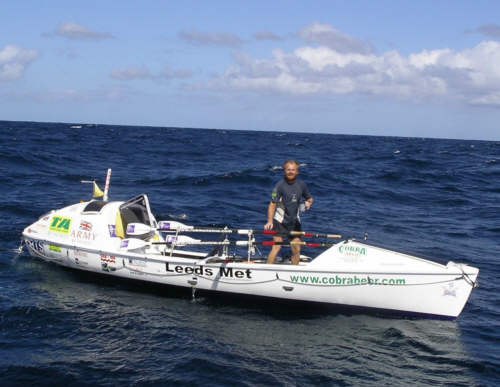Solo Rowing Expedition ‘Dragon Row’, North Atlantic, June / July 2006
Territorial Army
On 27 June 2006 Territorial Army Soldier Rob Munslow began his epic adventure to row solo unsupported across the North Atlantic. Departing St Johns, Newfoundland, Canada, Munslow would arrive at Rosevear Island, Isles of Scilly in a time of 64 days 10 hours 48 minutes - a time that would see him enter into the Guinness Book of World Records for the Fastest Solo Unsupported Row of the North Atlantic, Land to Land.
Aged 15, Munslow read the story of ex Para Tom McClean, the first man to row the North Atlantic Solo in 1969; it was a story that would have a profound impact on the direction of his life. In the moments of reading the article, he was inspired and vowed to himself that one day he would emulate McClean’s incredible feat.
 Rob Munslow |
 Rob Munslow Onboard Carnegie X-Stream |
Eight years later and Munslow, now a 23 year old who had never been to sea before, was one of a four man crew onboard Skandia Atlantic Spirit. It was an attempt to cross the North Atlantic that would be aborted after 21 days and 1,200 miles of rowing due to severe weather and damage to the boat. Undeterred, Munslow and three crew mates returned with a new boat, better prepared and more determined. They made the crossing from St John’s Newfoundland to the Isles of Scilly in a time of 39 Days 21 Hours, 9 Minutes 30 Seconds. It was a new World Record for the Fastest Unsupported Crossing of the North Atlantic.
For many, such an achievement would be enough but not for Munslow; he had bigger plans. The previous two expeditions had given him confidence, self belief, and experience and, combined with his military training, he was now ready to go forward and take on the might of the North Atlantic on his own.
Planning and preparation began in October 2005, yet by February 06 Munslow had only raised £6,000 committed to the project, and he had to obtain a loan in order to purchase the boat. Making the start line was incredibly difficult, but with the support of the TA and Army and other corporate sponsors he finally scraped the funds together to pay for vital safety equipment just two weeks before departure.
On 10 May 06, Munslow and his support crew flew to St Johns, Newfoundland, retrieving his boat Carnegie X-Stream from customs. Final preparations were completed, and by 14 May he was ready to depart. However, he would now have to wait for a suitable break in the weather. Finally, on 27 June he got the break he was waiting for.
The North Atlantic route from Canada to Europe has witnessed 14 Solo attempts, of which only 6 achieved successful crossings. Of the 8 failures, 3 lost their lives. Munslow knew he was entering the unknown undertaking a route that crosses the location of the Perfect Storm and resting place of the Titanic. He faced dense fog, storms and icebergs. On top of this, he had to deal with the blisters and sores that rowing upwards of 16 hours a day, day in day out creates.
On day 16, with 1,500miles to the finish, Munslow was to discover that his water desalinator had ceased to function with just 64 litres of drinking water onboard he rationed himself to just 1-1.5ltrs of water and caught rainwater in order to supplement his supplies. Perilously close to severe dehydration, his lack of water impacted on his calorie intake as the dehydrated rations onboard could not be consumed without using drinking water.
If these circumstances were not difficult enough, then the news on day 41 was far from helpful. Munslow was just 400 miles from the Isles of Scilly when he received a severe forecast from the weather router. For the next 10 days, he was battered by Northerly storm force winds, slowly drifting further away from the finish; this was becoming a real test of his tenacity and patience. As the conditions deteriorated, he began the longest 10 of his life. Having capsized twice and suffering with severe sea sickness, the successful completion of this attempt solo row looked perilously close to failing. Miraculously though, Munslow and his boat Carnegie endured these conditions and came through with only superficial damage.
With settled weather conditions, the final row for home began. Despite many close calls with large ships, he rowed on and made landfall at Rosevear Island, Isles of Scilly in a time of 64 days 10 hours 48 minutes - a World Record for the Fastest Solo Unsupported Crossing of the North Atlantic Land to Land.